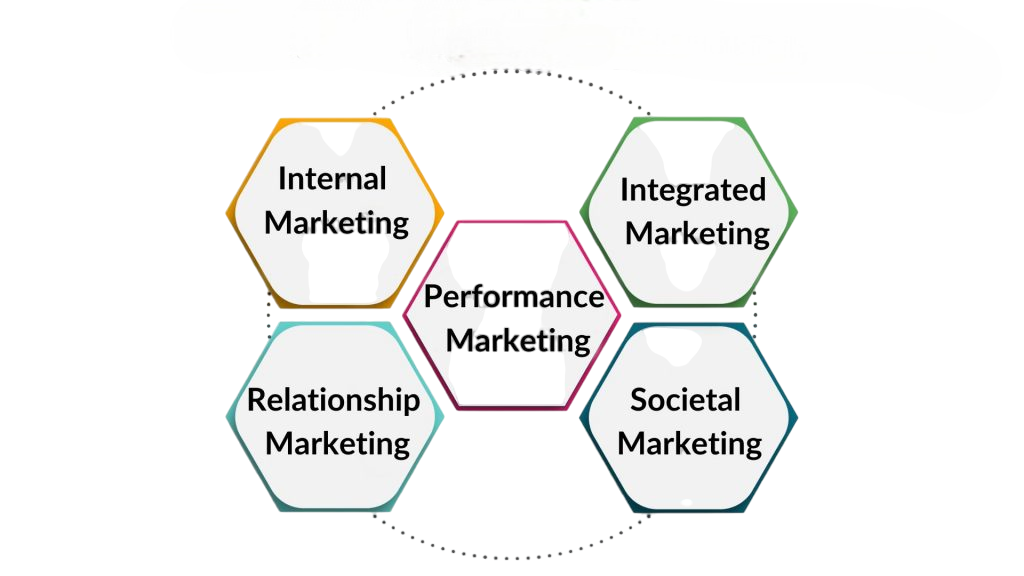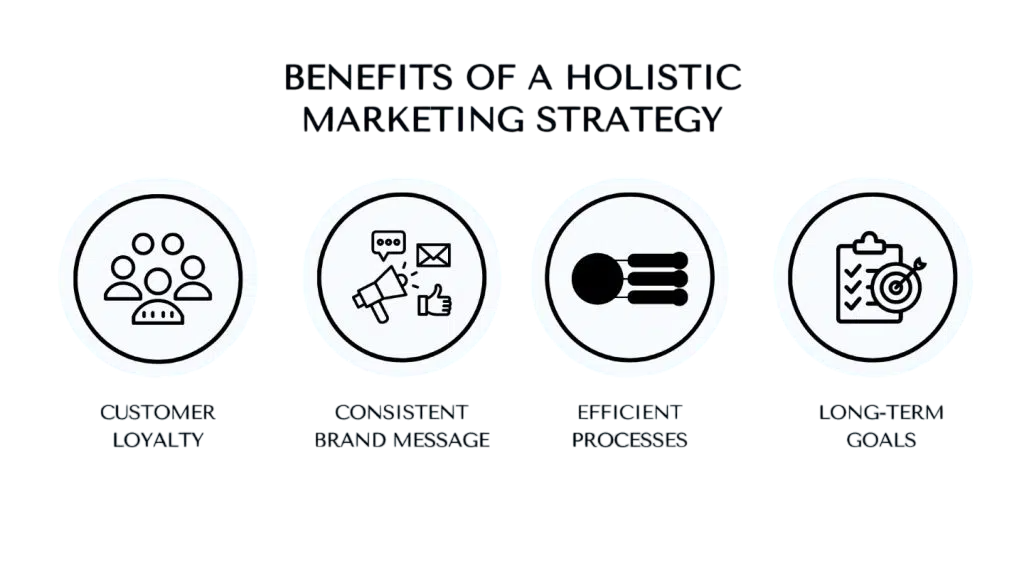
- Introduction to Holistic Marketing
- What is Holistic Marketing
- Why Holistic Marketing Matters
- Principles of Holistic Marketing
- Components of Holistic Marketing
- Benefits of Holistic Marketing
- Strategies for Implementing Holistic Marketing
- Case Study of Holistic Marketing
- Conclusion: Embracing Holistic Marketing
Introduction of Holistic Marketing
In contrast to conventional marketing, it guarantees the development of synergy between organizational departments. The outcomes are frequently better than anticipated if every resource is used to accomplish a single objective Digital Marketing Training . When a company uses this method, it begins developing a marketing plan that takes into account every employee. Stakeholders, clients, staff, suppliers, and vendors are all included in this. Being inclusive is encouraged by the holistic marketing approach since it avoids needless disputes that could impede the goal’s accomplishment.
What is holistic Marketing?
A method known as holistic marketing concentrates on the entire company rather than just certain components or elements. It incorporates a number of marketing methods while taking into account every facet of the business’s operations, such as internal operations, customer interactions, environmental considerations, and societal effects. By directing all marketing efforts towards a Google Analytics Explained single focus, this approach aims to give customers a unified and streamlined consumption experience. It is an articulation of how different marketing elements come together to address the diverse needs of consumers and stakeholders, as well as create an extensive and coherent brand impression.
Ready to Get Certified in Digital Marketing? Explore the Program Now Digital Marketing Online Training Offered By ACTE Right Now!
Content Strategy and Planning
- Customer-Centric: Its key objective is to fulfill the customer’s needs and desires at all touchpoints. It involves fulfilling the wants and needs of each customer in totality and undertaking extensive market research in order to learn their preferences and behaviors.
- Long-Term Relationship: By providing value, it hopes to establish enduring relationships with its clients. This involves outstanding encounters, continuous assistance, and personalized customer service.
- Consistency: By maintaining a consistent brand identity, messaging, and visual components, businesses can ensure a consistent customer experience across all platforms and channels Digital Marketing Career . This consistency boosts the overall impact of marketing campaigns, builds trust, and improves brand awareness.
- Efficiency: The objective of holistic marketing is to optimize time, finance, and resources for the achievement of desired outcomes. Firms can generate more outputs by using technologies and making better use of resources.
- Effectiveness: It takes a holistic strategy towards connecting to the client; holistic marketing is crucial. By considering the entire gamut of marketing elements, such as social and emotional, it creates a consistent, integrated brand message.
- Integrated Marketing: The primary goal of integrated marketing is to carry out marketing initiatives in order to accomplish common objectives. It guarantees synchronized communication and a powerful brand image.
- Internal Marketing: Customers in Holistic Marketing can be divided into two categories. Both the external and Internal Marketing ones. Although external consumers are the primary target audience for every organization, internal customers are still significant. They are also quite important. In this case, the company’s employees are the internal customers.
- Relationship Marketing: Relationship marketing involves the relationships a business maintains with its clients, staff, competitors, and shareholders. It focuses on developing thorough, mutually beneficial business strategies that will assist in the achievement of all the business’s objectives in the long term Digital Marketing Training .
- Societal Marketing: Societal marketing also takes into account the well-being of society and the environment in an attempt to satisfy customers’ needs. It involves tackling societal problems through ethical business practices, encouraging moral behavior, and incorporating social and environmental concerns into marketing strategies. Ethical marketing strategies are the focus of societal marketing.
- Performance Marketing: Performance marketing is an essential part of comprehensive marketing plans. It emphasizes quantifiable and traceable outcomes through the use of platforms like social media, digital advertising, and search engine marketing.
- Optimized Resource Allocation: By identifying the most effective paths and activities leading to shared company objectives, holistic approaches facilitate the optimization of resource deployment.
- adaptation: Since it considers a range of factors influencing the firm and adjusts strategy in turn, it provides adaptation to changes in the market context Step-by-Step Guide to Growing Your YouTube Channel .
- Measurable Outcomes: Measurable Outcomes Holistic marketing is full-cycle; it facilitates a better assessment and analysis of outcomes, thus encouraging decision-making based on data.
- Innovation and Creativity: Because it looks beyond discrete elements and pursues comprehensive solutions, it promotes innovation and creativity in marketing tactics.
- Align All Departments: Ensure marketing, sales, operations, and customer service work together toward common goals to deliver a consistent brand experience.
- Integrated Communication: Maintain uniform messaging across all channels, including digital, print, social media, and in-person interactions.
- Customer-Centric Approach: Focus on understanding customer needs, Social Media as the Umbrella preferences, and feedback to build long-term relationships.
- Employee Engagement: Train and motivate employees to embrace the brand values and actively contribute to marketing efforts.
- Social Responsibility Initiatives: Incorporate ethical practices, sustainability, and community engagement into marketing strategies to enhance brand reputation.
- Incorporating Values in Marketing in the Tata Group: By integrating its values into its marketing strategies, diversified Tata Group has embraced holistic marketing. They focus on community development, social duty, and green campaigns Smart Ways to Learn .
- Amul: Establishing Credibility via Collaborative Promotion: India’s dairy business has undergone a transformation thanks to Amul, the flagship brand of the Gujarat Cooperative Milk Marketing Federation (GCMMF). The foundation of Amul’s marketing strategy is the idea of cooperative marketing, in which the farmers also own the brand.
To Explore Digital Marketing in Depth, Check Out Our Comprehensive Digital Marketing Online Training To Gain Insights From Our Experts!
Principles of Holistic Marketing
A number of key concepts constitute holistic marketing, which together form a comprehensive strategy. In bringing the constituent elements together, it aims to yield a comprehensive and customer-oriented strategy that will reinforce brand awareness and encourage closeness with customers SEO Tools .

Components of Holistic Marketing
Holistic marketing is a comprehensive approach that considers every aspect of a business to create a unified and customer-centric strategy. It is built on four key components: relationship marketing, which focuses on building long-term connections with customers, partners, and stakeholders; integrated marketing, ensuring that all promotional activities and messages are consistent across channels Mobile App Marketing ; internal marketing, which aligns and motivates employees to deliver the brand promise effectively; and social responsibility marketing, emphasizing ethical practices and contributing positively to society and the environment. By combining these components, holistic marketing ensures that every decision and action reinforces the brand, enhances customer satisfaction, and drives sustainable business growth.
Looking to Digital Marketing Training? Discover the Digital Marketing Expert Masters Program Training Course Available at ACTE Now!
Benefits of Holistic Marketing
Holistic marketing possesses several benefits. To build a consistent and effective strategy that goes beyond singular practices and sustains long-term company success, it integrates various marketing functions.

Preparing for Digital Marketing Job Interviews? Have a Look at Our Blog on Digital Marketing Interview Questions and Answers To Ace Your Interview!
Strategies for Implementing Holistic Marketing
Case-study of holistic Marketing
The following examples show how well-known Indian firms have adopted holistic marketing by emphasizing customer-centricity, Measurable Outcomes, empowering communities, integrating values, and fostering wellness. These tactics go beyond conventional product-centric methods, building stronger relationships with customers and bolstering these brands’ long-term prosperity.
Conclusion
Holistic marketing can help businesses create long-term growth, build customer loyalty, and establish a strong and memorable brand experience. Businesses can effectively reach out to their target audience, develop good relationships, and distinguish themselves in the competitive marketplace by incorporating different marketing constituents and being knowledgeable Digital Marketing Training about the customer journey. While an is best suited for individuals seeking to strategically lead comprehensive marketing initiatives and promote long-term company success, enrolling in one can offer a strong basis for carrying out such integrated plans.




